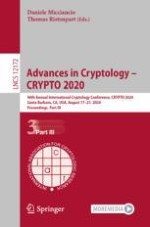2020 | OriginalPaper | Buchkapitel
Shorter Non-interactive Zero-Knowledge Arguments and ZAPs for Algebraic Languages
verfasst von : Geoffroy Couteau, Dominik Hartmann
Erschienen in: Advances in Cryptology – CRYPTO 2020
Aktivieren Sie unsere intelligente Suche, um passende Fachinhalte oder Patente zu finden.
Wählen Sie Textabschnitte aus um mit Künstlicher Intelligenz passenden Patente zu finden. powered by
Markieren Sie Textabschnitte, um KI-gestützt weitere passende Inhalte zu finden. powered by
Abstract
-
conceptual simplicity, parameters derive from the \(\varSigma \)-protocol;
-
proofs as short as resulting from the Fiat-Shamir heuristic applied to the underlying \(\varSigma \)-protocol;
-
fully adaptive soundness and perfect zero-knowledge in the common random string model with a single random group element as CRS;
-
yields simple and efficient two-round, public coin, publicly-verifiable perfect witness-indistinguishable (WI) arguments(ZAPs) in the plain model. To our knowledge, this is the first construction of two-rounds statistical witness-indistinguishable arguments from pairing assumptions.
